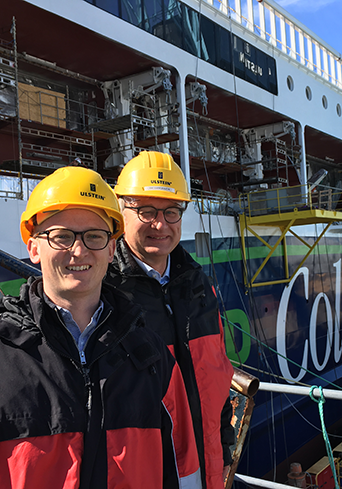

While 2020 will stand as a dramatic year for the global cruise industry due to Covid-19, it also presents an opportunity for operators to develop their onboard systems and get ahead of future energy efficiency requirements. Many vessels are already docked and undergoing refurbishment of cabins, public spaces and engine rooms.
And while engines and electrical systems are obvious places to look for energy savings - and thereby fuel savings and dollar savings – there are low hanging fruits to pick, which will yield an even faster return on investment.
By optimizing your freshwater cooling systems below deck and your HVAC systems above deck with pressure independent control valves (PICV), it is possible to achieve significant savings on pump energy consumption.
If you are currently utilizing 3-way valves you can expect savings of more than 50%, while replacing static 2-way valves will bring your savings above 40%. However, the most significant savings can be found below deck where cooling systems with no flow control are very common. By optimizing here, we have generally seen customers realize savings of up to 70%.
In a market facing increasing environmental standards and regulations – including a higher fuel price due to the need for distillate fuel to limit sulphur emissions – these numbers will lead to an almost immediate effect on any cruise operator’s bottom line. Frese’s customers have, in fact, seen returns on investment of one to two years, in some cases even down to a few months.
While it is, of course, possible to integrate PICV technology in new builds, there is a huge untapped potential in retrofitting Frese valves into the existing cruise fleet. The retrofit itself requires no changes to your pipework and only a small addition to your pumps in the form of variable frequency drives to establish control. Other than that, it is simply a matter of exchanging the required valves for dynamic Frese valves.
Frese’s patented pressure independent technology is an innovative, energy saving alternative to traditional hydronic balancing and control methods, and it provides efficient and accurate flow and differential pressure control.
By being pressure independent, the valves ensure that design flow conditions are achieved at all times, irrespective of pressure fluctuations in the system, and also eliminate overflows in the system – resulting in significant pump energy savings.
Dynamic valves hold several other advantages over traditional, static balancing valves.
They contribute to simplified system designs by eliminating the need for additional balancing valves in the distribution pipework and are highly flexible if your system needs to be modified or expanded at a later date.
Pressure independent control valves are also much easier to commission since they require no proportional balancing. They automatically adapt to any changes in the rest of the system. A case study of Frese by Odense Maritime Technology A/S estimates reductions of 50% to 80% in commissioning hours related to the fact that with the Frese valves you can do the commissioning work unit by unit or zone by zone without interference from pressure fluctuations from other consumers.
At Frese we pride ourselves on being more than a supplier of high-quality products – we are a reliable partner and trusted advisor who can help you build your business case for a transition from static to pressure independent valves.
For over 30 years we have provided dynamic balancing and flow control technology for HVAC systems on land in everything from residential and commercial buildings to shopping malls and not least hotels – which share many similarities with cruise ships carrying passengers around the world.
In 2002 we entered the marine industry sector and began developing products specifically targeted to this market. We expanded our portfolio to include our well-tested technology in new materials, such as nickel-aluminum bronze and high-grade stainless steel in order to meet the marine industry’s demands for highly corrosion resistant materials.
Frese’s ability to adapt our technology to meet the demands of the marine sector, where it must perform flawlessly in the most arduous environments, stems from our extensive knowledge of materials, products and applications, which we have built up over 75 years.
In 1944 the company started as a small foundry which expanded and came to specialize in sand casting of customized solutions for the most demanding of applications in a range of alloys including bronze, nickel aluminum bronze, stainless steel and duplex steel.
The foundry remains an integral part of Frese to this day, but the core business for the company lies in our development and production of dynamic valves where we hold a prominent position as one of the world’s leading providers of innovative fluid control and component solutions.
